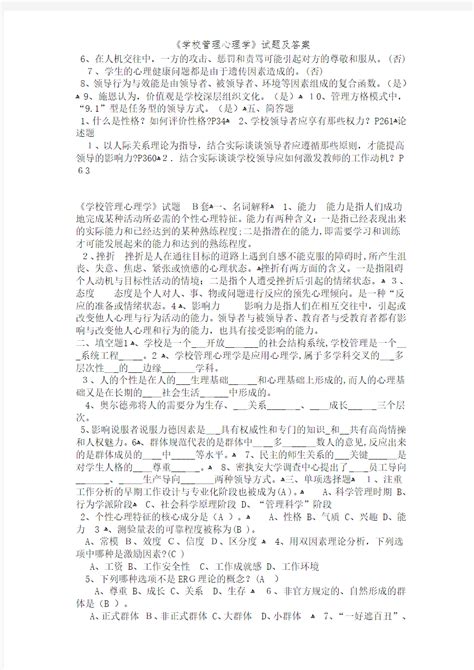管理心理学课后答案(刘永芳)第三版

Management Psychology: Answering AfterClass Questions
Understanding management psychology in the workplace is essential as it helps organizations create a positive work environment, enhance employee motivation, improve communication, and foster effective leadership. By delving into the psychological aspects of management, leaders can better understand employee behavior, decisionmaking processes, and team dynamics, leading to increased productivity and job satisfaction.
Managers can apply various psychological principles to enhance team performance, such as setting clear goals, providing constructive feedback, fostering a supportive work culture, promoting collaboration, and recognizing individual strengths. By understanding the diverse personalities and motivations within a team, managers can tailor their leadership approach to maximize team productivity and cohesion.
Emotional intelligence plays a crucial role in effective management as it relates to selfawareness, selfregulation, empathy, and social skills. Managers with high emotional intelligence can better understand their own emotions and reactions, regulate them in challenging situations, empathize with their team members, and build strong relationships based on trust and mutual respect. This not only leads to improved communication but also enhances overall team performance and job satisfaction.
Managers can effectively manage conflict within a team by promoting open communication, active listening, mediation, and conflict resolution techniques. It is important for managers to address conflicts promptly, understand the underlying issues, encourage constructive dialogue, and collaborate with the team to find amicable solutions. By fostering a culture that values respectful disagreement and constructive feedback, managers can turn conflicts into opportunities for growth and collaboration.
Employee motivation in the workplace is influenced by various factors, including recognition, opportunities for growth, worklife balance, job autonomy, meaningful work, and a supportive organizational culture. Managers play a pivotal role in understanding the unique motivators of their team members and creating a motivating environment that encourages high performance, creativity, and job satisfaction.
Managers can promote worklife balance among employees by encouraging flexible work arrangements, setting realistic work expectations, leading by example in prioritizing wellbeing, promoting mental health initiatives, and creating a supportive work culture that values both productivity and personal time. By recognizing the importance of worklife balance, managers can boost employee morale, reduce burnout, and improve overall job satisfaction and retention rates.
Managing a remote team poses unique challenges from a psychological perspective, such as feelings of isolation, communication barriers, lack of team cohesion, difficulties in monitoring performance, and worklife balance issues. It is crucial for managers to implement strategies that promote virtual team building, develop clear communication protocols, provide regular feedback and support, and ensure that remote employees feel connected and valued. By addressing these challenges proactively, managers can successfully lead remote teams to achieve their goals effectively.
